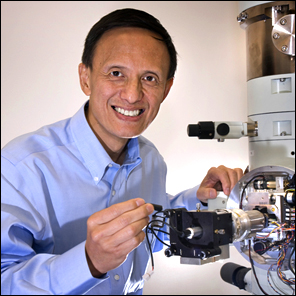Brookhaven Lab Scientist Yimei Zhu Elected Inaugural Fellow of the Microscopy Society of America
June 24, 2009
UPTON, NY — Yimei Zhu, a scientist at the U.S. Department of Energy’s Brookhaven National Laboratory, has been elected the inaugural Fellow of the Microscopy Society of America, an affiliate of the American Institute of Physics and the American Association for the Advancement of Science. Limited to a small fraction of members, the designation of Fellow recognizes senior distinguished members of the society who have made significant contributions to the advancement of the science and practice of microscopy.
Zhu will formally be awarded the society’s first fellowship at its annual meeting in Richmond, Virginia, to be held in July. His citation reads: “For outstanding and innovative development and implementation of advanced electron microscopy techniques including quantitative diffraction, imaging, spectroscopy, and phase retrieval methods in understanding superconducting, ferromagnetic, and strongly correlated materials.”
“The Microscopy Society of America is a very large and diversified society with members working in both physical sciences and life sciences. I am very happy about this recognition from my peers in the society,” Zhu said. “I am fortunate to be able to work with my colleagues at Brookhaven Lab, where we have several world-class electron microscopes, and where I have access to complementary methods at the National Synchrotron Light Source [NSLS] to study the structure and properties of materials at the atomic scale. Eventually, I will have access to more sophisticated probes at the NSLS-II.” Currently under construction, the NSLS-II will be the world’s brightest synchrotron when it goes online in 2015.
Unlike optical and x-ray microscopes, which use light to magnify objects and their inner structures, electron microscopes project electrons toward the material under study. The electrons penetrate the sample to reveal its atomic structure, which can be related to its properties. Zhu and his group use state-of-the-art electron microscopes that can magnify an object more than 50 million times its size.
Zhu’s work includes assessing the structure and properties of materials such as thermoelectirics that can convert heat to electricity, superconductors that can conduct electricity with no energy loss, and materials that can be used in magneto-electronic devices at nano-scale dimensions for applications ranging from digital communication to data storage.
Zhu earned a B.S. in materials physics from JiaoTong University, Shanghai, in 1982, and was one of the first few students selected in China to pursue graduate study abroad after the country opened its doors to the West. He received his M.S. and Ph.D., also in materials physics, from Nagoya University, Japan, in 1985 and 1987, respectively. After working as a research associate at the University of Virginia, Zhu joined Brookhaven in 1988 and rose through the ranks to become a senior scientist in 2002. He is an adjunct professor at Columbia University and Stony Brook University.
A Fellow of the American Physical Society, Zhu has won numerous awards for his work, including the International Federation of Societies for Electron Microscopy’s Kazuo Award in 1986, the American Ceramic Society’s Roland B. Snow Award in 1988, the U.S. Department of Energy’s Chunky Bullet Award in 2001, and Brookhaven Lab’s Distinguished Science and Technology Award in 2003.
2009-10981 | INT/EXT | Newsroom










